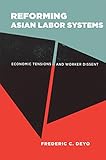Reforming Asian Labor Systems : Economic Tensions and Worker Dissent / Frederic C. Deyo.
Material type: TextPublisher: Ithaca, NY : Cornell University Press, [2012]Copyright date: ©2012Description: 1 online resource (280 p.) : 2 line figures, 12 tablesContent type:
TextPublisher: Ithaca, NY : Cornell University Press, [2012]Copyright date: ©2012Description: 1 online resource (280 p.) : 2 line figures, 12 tablesContent type: - 9780801450518
- 9780801463945
- Industrial relations -- Asia
- Industrial relations -- Asia
- Labor policy -- Asia
- Labor policy -- Asia
- Labor -- Asia
- Labor -- Asia
- Working class -- Political activity -- Asia -- Asia
- Working class -- Political activity -- Asia
- Asian Studies
- Labor History
- Sociology & Social Science
- SOCIAL SCIENCE / Sociology / General
- 331.1095 23
- HD8653.5 .D49 2016
- online - DeGruyter
- Issued also in print.
| Item type | Current library | Call number | URL | Status | Notes | Barcode | |
|---|---|---|---|---|---|---|---|
 eBook
eBook
|
Biblioteca "Angelicum" Pont. Univ. S.Tommaso d'Aquino Nuvola online | online - DeGruyter (Browse shelf(Opens below)) | Online access | Not for loan (Accesso limitato) | Accesso per gli utenti autorizzati / Access for authorized users | (dgr)9780801463945 |
Frontmatter -- Contents -- Acknowledgments -- Introduction -- Part I. Labor Systems, Economic Development, and Market Reform -- 1. Labor Systems: Social Processes and Regulatory Orders -- 2. Explaining Regulatory Change -- 3. Reforming Labor Systems: Neoliberalism, Reregulation, and Social Compensation -- Part II. Deregulating Asian Labor Systems -- 4. Export-Oriented Industrialization and State-Enterprise Reform: Restructuring Employment -- 5. External Liberalization of Trade and Investment -- 6. The Deregulatory Face of Labor Reform -- Part III. The Tensions of Reform -- 7. Compromising Economic and Social Agendas -- 8. Political Tensions of Reform: Labor Opposition and Public Disorder -- Part IV. Addressing the Tensions of Reform -- 9. The Reregulatory Face of Labor Reform: Institutionalization, Social Compensation, and Developmental Augmentation -- 10. Disciplining Labor and Rebuilding the Labor Process -- 11. Small Enterprises, Supplier Networks, and Industrial Parks: Creating High- Skill Developmental Labor Systems -- 12. Contesting Reform: The Influence of Labor Politics -- Conclusion -- References -- Index
restricted access online access with authorization star
http://purl.org/coar/access_right/c_16ec
In Reforming Asian Labor Systems, Frederic C. Deyo examines the implications of post-1980s market-oriented economic reform for labor systems in China, South Korea, the Philippines, and Thailand. Adopting a critical institutionalist perspective, he explores the impact of elite economic interests and strategies, labor politics, institutional path dependencies, and changing economic circumstances on regimes of labor and social regulation in these four countries. Of particular importance are reform-driven socioeconomic and political tensions that, especially following the regional financial crisis of the late 1990s, have encouraged increased efforts to integrate social and developmental agendas with those of market reform.Through his analysis of the social economy of East and Southeast Asia, Deyo suggests that several Asian countries may now be positioned to repeat what they achieved in earlier decades: a prominent role in defining new international models of development and market reform that adapt to the pressures and constraints of the evolving world economy.
Issued also in print.
Mode of access: Internet via World Wide Web.
In English.
Description based on online resource; title from PDF title page (publisher's Web site, viewed 02. Mrz 2022)


